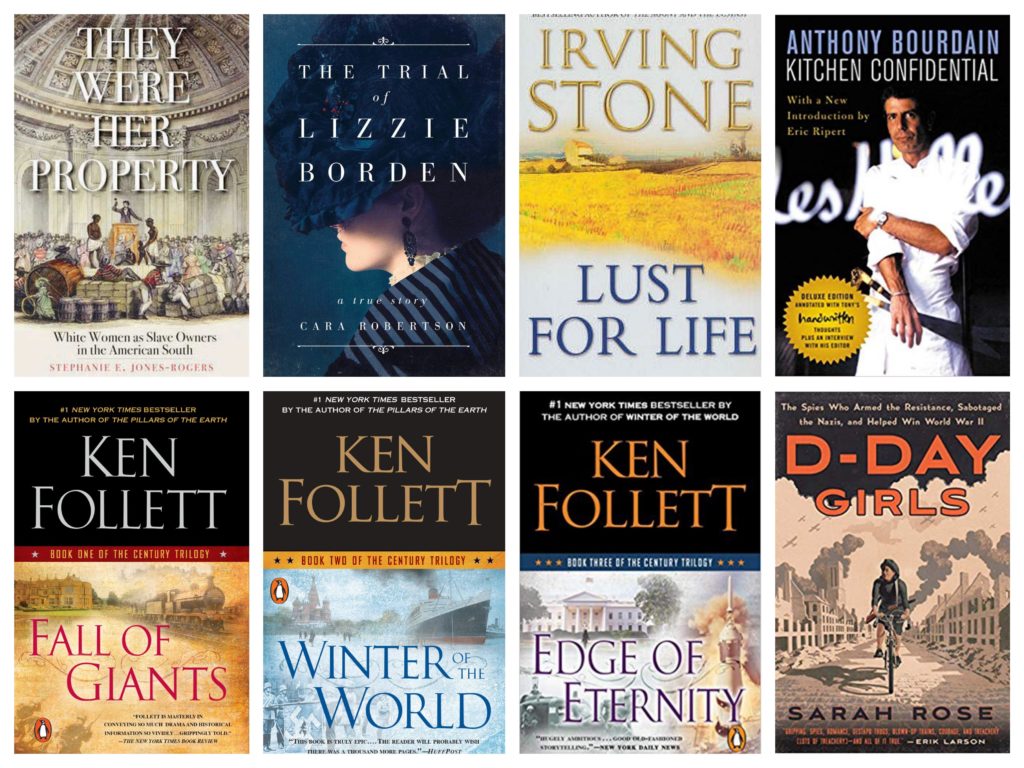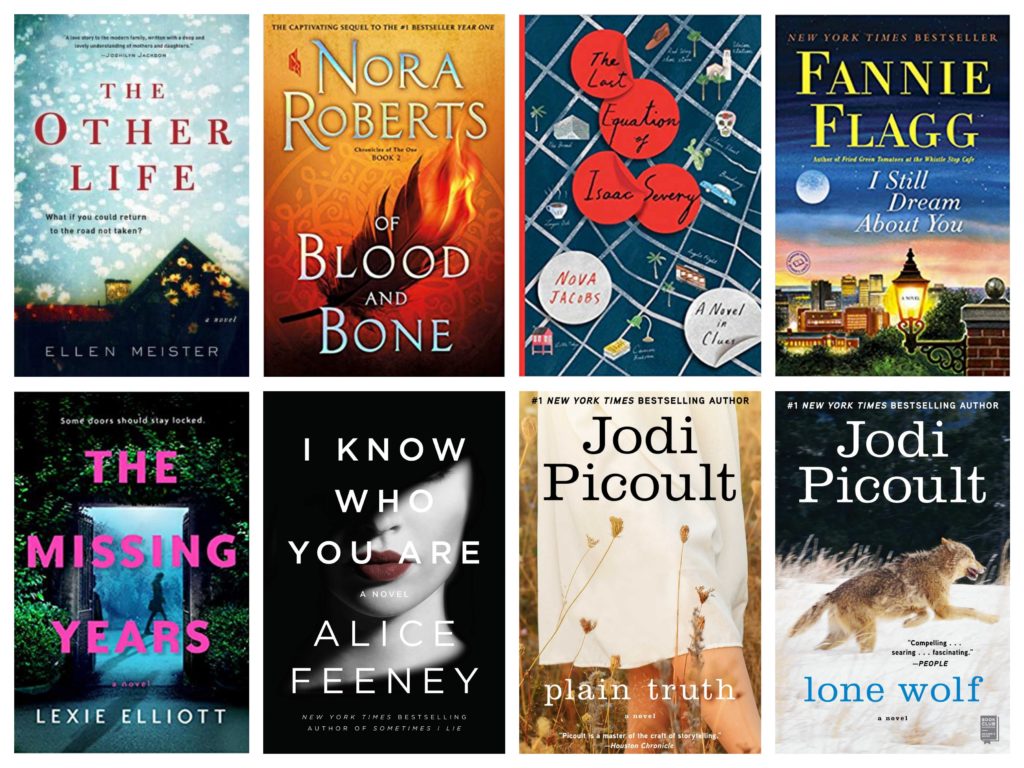There’s Still Time for Summer Reading
If you have a teacher or academic in your life, be gentle right now. Because now is about the time they’re looking at the calendar and realizing summer is basically over in five minutes and they have a thousand things left to do before school starts again. Or, is that just me??
Despite the horrifying realization that school is just around the corner and I haven’t actually crafted my summer writing plan, let alone accomplished much of anything*, there’s one arena where I’ve been consistently successful: Reading. (Or “reading” for those of you incorrect folks who don’t “count” audiobooks as actual books. Ahem.)
In the second quarter of 2019, but mostly in May and June, I inhaled 16 books, all from the library. My absolute favorites of this batch? Anthony Bourdain’s “Kitchen Confidential” and “They Were Her Property” by Stephanie E. Jones-Rogers. Both nonfiction, these books made me think about aspects of life–restaurants and American history–differently than I had before. Both were beautifully written and emotionally moving.
“Kitchen Confidential” was read by the author, which added a layer of emotionality I didn’t expect, especially considering I listened to it near the anniversary of his suicide. I felt particularly sad listening to it because he was so funny, smart, talented, and hearing his stories and wisdom only drove the point home that we’ve lost such an important cultural icon and human. I learned a TON about restaurants from his book and will never, ever order the fish special again.
“They Were Her Property: White Women as Slave Owners in the American South” is a completely different style, a historical analysis of the role that white women played in the slave trade, based upon the author’s dissertation research. It. Was. FASCINATING. And also horrifying. On the one hand, Jones-Rogers offers a unique feminist lens to women’s role in American history. She describes myriad examples of women as active agents in their lives/communities–as business and property owners navigating without and in some cases around men to accomplish their goals. This picture is a stark contrast to the coddled/thwarted picture of gentility I’m used to when thinking about American history of the south. Of course, all of that awesome feminist agency? It was used to control and navigate their part of the slave trade. [Insert massive facepalm here] The book smartly undermined so much of what has been assumed about white women in American history stories of the south–they weren’t passive or protected from the violence and ugliness of slavery–they were regularly a part of it. It was an uncomfortable but important read, and one that I definitely recommend.
Non-Fiction and Historical Fiction Faves

- Of this collection, I liked “The Trial of Lizzie Borden” least. It was very dry nonfiction and I had a hard time staying engaged.
- Ken Follett’s Century Trilogy is most excellent, a re-listen for me and a gigantic time commitment. The historical fiction books are each 20-25 hours long, and cover World Wars I and II, and the Cold War from the perspectives of characters from Britain, Germany, Russia, and the U.S., whose lives are all intertwined. I appreciated the empathy building encouraged by considering historical conflict from various cultural perspectives.
- “Lust for Life” details the tragic life and career of Vincent Van Gogh, and if I hadn’t looked it up, I wouldn’t have known it was written in the 1930s. Super fascinating.
- “D-Day Girls” is a wonderful nonfiction book about the work of women spies during World War II. I LOVED hearing stories of women’s important work during the war–stories I didn’t even know existed! Unfortunately, the audio version was terrible. I had to stop listening I was so annoyed by the cadence and tone of the narrator. Definitely recommend a hard copy of this one.
Recent Fiction Reads

- Of this collection, I enjoyed Fannie Flagg’s “I Still Dream About You” best. Read by the author (who wrote Fried Green Tomatoes), the book is laugh out loud funny in parts, and is an unexpectedly charming book about a Miss America runner-up and aging southern belle who is plotting her own demise. I loved the book’s emphasis on female friendships and how women navigate getting older with times changing around them.
- During my First Quarter Reading Report, I thought Ellen Meister’s “The Other Life” was going to be one of my top books of 2019. It describes the life of a woman who gets a chance to jump between worlds and see what her life would have been like if she’d made different major choices e.g., marrying a different man. During the early part of the book, she slips through a portal to an alternate world where she stayed with her needy boyfriend, but her mother was still alive, which was in contrast to her current life with her husband and son, but her mother was dead from suicide, and the new baby she was carrying was most likely going to die due to congenital defects. There’s also an art heist, a gay brother with serious mental illness, and consideration of abortion. In other words, there’s a lot going on in this book. Unfortunately, it felt really messy, and the portal jumping a bit contrived. I was glad when this one was finally over.
- If you’re into psychological thrillers, both Lexie Elliott’s “The Missing Years” and Alice Feeney’s “I Know Who You Are” were engaging, quick reads.
- I wanted to love “The Last Equation of Isaac Severy” by Nova Jacobs–a clue-based murder mystery involving a complicated family with two math geniuses, the elder of whom was trying to create an algorithm that would predict/solve LA traffic. But some of the turning points were too nonsensical and the characters a little too annoying. I couldn’t suspend disbelief enough to buy the narrative.
- Nora Roberts’ “Of Blood and Bone” is the second in a trilogy and I won’t lie, not my favorite book of hers. I hope the final installment reads more like the first.
- “Plain Truth” and “Lone Wolf” started a Jodi Picoult kick for me. If you’re looking for emotional, painful stories of humanity, where you get to learn about particular cultures or contexts–in these cases, the Plain Folk of Pennsylvania and the wolves of Canada, respectively–and consider challenging human circumstances like infanticide and when to remove life support for someone in a persistent vegetative state–these books are for you! Both are well-written and thoughtful considerations of moral topics.
Happy reading, ya’ll!
xoxo,
shawna
*I mean, things have gotten done, just not according to any cohesive action plan.


